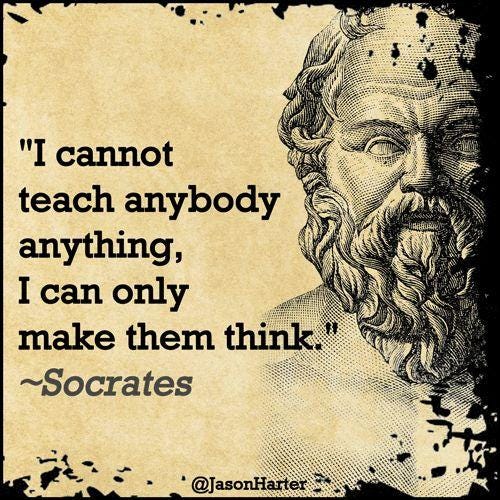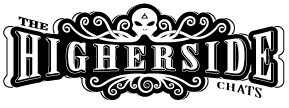Socratic Method: The Art of Questioning
[IMG align="left" width=240px]  [/IMG]The Socratic method is a discipline of questioning that can be used to study thought under the microscope, such as when exploring (complex) ideas, getting to the truth of things, uncovering assumptions, analyzing concepts, distinguishing what we know from what we don't know, and to tracing out logical implications of thought.
[/IMG]The Socratic method is a discipline of questioning that can be used to study thought under the microscope, such as when exploring (complex) ideas, getting to the truth of things, uncovering assumptions, analyzing concepts, distinguishing what we know from what we don't know, and to tracing out logical implications of thought.
It's kind of like the child that keeps asking "why?" and tends to annoy adults, only to generate an unforeseeable feedback-loop of insights with great new implications brought on by the inquisitive child-mind.
I insist on the word discipline because Socratic questioning is distinguished from regular questioning by its rigorous, systematic, deep and detached way of getting to the core of things (concepts, principles, issues, or problems) using questions. Contradictions often indicate a jackpot, a true wrench in the wheel the makes you feel vertigo, and often reveals the flaws in our thinking. A true divine intervention.
The reason I bring this here is that it is perhaps the most powerful way of analyzing thought and exploring ideas. This is a powerful skill that provides the tools to break down complex ideas and assess the quality of our thoughts. It's powerful because it can act as a shining light, or better, a laser-focused beam in the darkness. A good Socratic dialogue usually is food for the soul for all participants, it can get uncomfortable and testing, but in the end, it leaves everyone with a sense of humility and wonder at seeing from a new widened perspective.
It's also what allows us to admit we were wrong when confronted with incoherence in our logic and to aspire towards a more coherent/logical and holistic perspective.
THC and the work of Greg is actually a good example (and a great mentor) of Socratic questioning, whereby basic assumptions are questioned and put in the spotlight. Greg is usually very good at keeping detachment and focus on the exploration of ideas, rather than on choosing sides to fight. In a Socratic dialogue (as it usually involves more than one person to bounce ideas), the goal is never to be right, but rather, to explore thoughts out of genuine curiosity or need to understand something.
I've never ever been taught or studied this at school, not even at the university level. Yet, I feel it is one of the most fundamental skills to have to navigate in society. Why? Because if we are not capable of thinking critically (and especially of our own thoughts and intentions) then we are always repeating someone else's thought patterns and without any sovereignty.
There are a thousand ways of studying this skill, but I would highly recommend the following book, for it is a great, simple introduction to the field, and includes some illuminating examples of transcripts between a teacher and his students in a class (attached below is an excerpt).
Conclusion
There is a lot more to be said about the Socratic method, including guidelines to practice and cultivate this in your wetware so as to become second nature. Something similar to this which I've cultivated over the years is to remind myself that I know nothing, especially in those moments where emotions take over our reasoning.
I will say that as important as it is to nurture our instincts/heart-mind, it is equally important to learn how to master thought-craft with brain-mind. The two together make an indomitable and sovereign spirit.
In fact, I've been pondering for the case of a Socratic personal assistant that would be capable of helping us organize, analyze ideas or questions in a systematic way to get insights. Any app developers interested? I think this could be the next big thing (the closest thing to the Yi-ching) 😉
“Thinker's Guide to the Art of Socratic Questioning.” Richard Paul and Linda Elder (2016) - Amazon, Download (PDF, Ebook)
[IMG width=231px]  [/IMG]
[/IMG]
I love this. I tend toward evaluating arguments by identifying logical fallacies - in other words, poking holes. But the chart you attached is more open and useful for non-confrontational discussions.
When applying Code of Federal Regulations, I often sounded like a broken record advising co-workers: We need to focus on the intent of the law. Recently, I realized the law is full of intention - which makes it kind of magickal when used properly.
One thing I have started to try to add to questions and arguments is: "How does my answer or rationale make me a hypocrite?" This one question is leading me to become less judgemental and more forgiving. I simply try to think of at least one instance where I have done or said something similar to the person or idea I now find myself disagreeing with.
- 44 Forums
- 3,664 Topics
- 16.3 K Posts
- 1 Online
- 23.4 K Members






